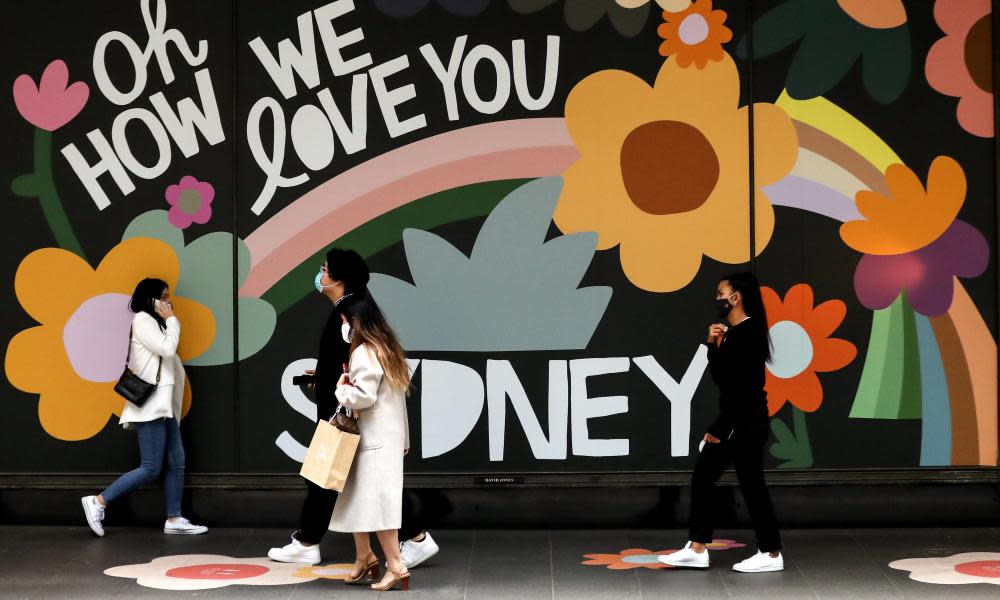Australia could see Covid surge from new variants even after 80% vaccination when border reopens

If the Australian international border is reopened while highly transmissible Covid-19 variants are circulating overseas or locally, large and disruptive outbreaks will still be possible after 80% of people aged 16 years are fully vaccinated, modelling published in the Medical Journal of Australia on Monday says.
It comes after the New South Wales premier, Dominic Perrottet, announced on Friday that from 1 November, returning Australians and tourists would be able to travel to Sydney without needing to hotel quarantine. However, later on Friday the prime minister Scott Morrison said the international border would only open to vaccinated Australian citizens and their immediate families and not tourists, saying “we will not rush”.
Related: Scott Morrison declares Australians will be first to return under NSW plan to end quarantine
The modelling, led by Dr Mark Hanly from the Centre for Big Data Research in Health at the University of NSW, applied various assumptions regarding transmissibility, vaccine rollout speed, and scale of border reopening to see the impact on virus cases and hospitalisations.
For scenarios that assumed a variant similar in infectiousness to the Alpha variant, opening international borders was followed by an increase in local transmission if local restrictions were limited to mask wearing and social distancing. However, “the number of people hospitalised with severe Covid-19 was very low” under this scenario, Hanly and co-authors wrote.
However, were the variant to enter Australia of similar infectiousness to the Delta variant, and circulated when 80% of people aged 16 years or more were fully vaccinated (64% of the total Australian population), opening the international border was followed by surges in both infections and hospitalisations. The modelling found this was the case whether 2,500 or up to 13,000 international arrivals were accepted per day. These surges would require public health measures beyond mask wearing and social distancing to avoid overwhelming the health system, the modelling found.
“The planned reopening of Australian borders to international travellers increases the risk of introducing new chains of infection and new variants of SARS-CoV-2,” the modelling found.
“Political and health system policymakers should not focus exclusively on defining vaccination thresholds at which particular restrictions might be removed. Instead, they should recognise that mass vaccination is unlikely to achieve complete protection against Covid-19.”
The chair of epidemiology at Melbourne’s Deakin University, Prof Catherine Bennett, said it was important to note that the modelling assumed no virus in the Australian community as a baseline when variants entered from overseas.
Email: sign up for our daily morning briefing newsletter
App: download the free app and never miss the biggest stories, or get our weekend edition for a curated selection of the week's best stories
Social: follow us on YouTube, Facebook, Instagram, Twitter or TikTok
Podcast: listen to our daily episodes on Apple Podcasts, Spotify or search "Full Story" in your favourite app
“So that’s no longer true,” Bennett said. “We’ve already got restrictions in place, which yes we’re going to ease out of, but we’re not going to get rid of completely.”
The model also assumed additional public health measures beyond mask wearing and social distancing, such as school closures, would only be brought in once new cases reached 10,000 per day. Bennett said it was likely additional restrictions would be triggered much sooner than the model assumed.
Related: All Australians able to travel overseas from November, says Morrison as he lifts travel ban
“It’s likely measures would be implemented that would stop us reaching 10,000 cases,” Bennett said. “This modelling emphasises that the focus should in fact be on the kinds of safety and health measures that lead to prevention, rather than waiting until the virus has gotten away from us to introduce them. And the good news is, I do think the international reopening being proposed does sit within those prevention settings.”
However, UNSW infection control expert and member of the World Health Organisation’s Covid advisory committee, Prof Mary-Louise McLaws, said she was concerned by the NSW international border reopening announced by Perrottet.
McLaws said while she was comfortable with hotel quarantine being scrapped, it would be important to test returning Australians for the virus the day they boarded the plane, upon landing, and only send home those who tested negative. Those who tested negative should still be tested with a rapid antigen test every day for five days, she said, and again five days after that.
“That way, you are then a minuscule risk of being a source of infection to the unvaccinated and immunocompromised,” she said. “Even the fully vaccinated are at risk of carrying the virus.”

 Yahoo Movies
Yahoo Movies 
